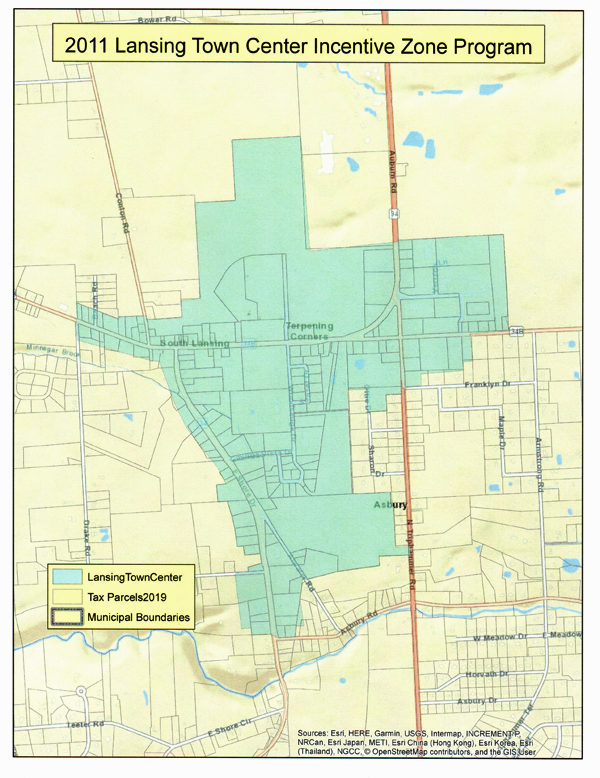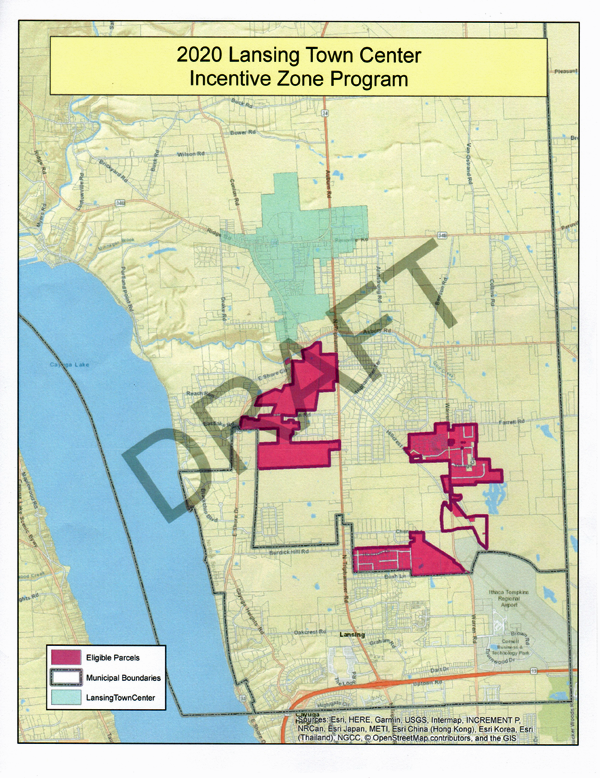- By Dan Veaner
- Business & Technology
 Print
Print 
Tompkins County has two business incentive zones: the City of Ithaca Community Investment Incentive Tax Abatement Program (CIITAP) and the Lansing Town Center Incentive Program. The Lansing program was created almost a decade ago when the Town Board began to seriously consider paying the State to remove deed restrictions on the town center land north of the town ball fields in order to create a Lansing Town Center. The program would encourage development in South Lansing in an area to the north and south of the Town Hall. At a special Town Board working session Wednesday Lansing Director of Planning C.J. Randall asked the Board to consider options for clarifying the existing zone and/or adding new portions of the Town that would be eligible for a special incentive package.
"You could simply clarify the existing incentive program and where that could fall," Randall said. "Another option is considering expanding the area for which you could be eligible for those incentives based on areas that have existing water and wastewater."
The Town Board approved a Lansing Town Center Incentive Zone in 2011. The proposal was presented to the Lansing Board by Lansing Economic Development Committee Chair Andy Sciarabba and Tompkins County Area Development (TCAD) Director Of Economic Development Services Heather McDaniel, who is now the president of TCAD.
"It's tough enough to develop anyplace now, because of all the rules and regulations and restrictions," Sciarabba argued. "Especially in a community that hasn't got all that large a population base that's been struggling to entice developers to our community. It's a way to say we want you to develop here in this area."
The Lansing program is one of only two in Tompkins County, the other being CIITAP. Essentially it is a way to fast-track developer applications for tax abatements granted by the Tompkins County Industrial Development Agency (IDA) in order to attract industrial and light manufacturing projects, retail and commercial developments, rental housing, and not-for-profits to the Town. Projects must have new construction costs of at least a half million dollars.
The standard abatement starts at 90% in the first year, decreasing in equal increments over a total of seven years before the full assessment is applied. Additionally local and state sales tax is waved on construction materials, equipment and furnishings. Eligible projects are also exempted from the Mortgage Recording tax.
 This map outlines the current incentive zone in Lansing.
This map outlines the current incentive zone in Lansing.At Wednesday's meeting Randall proposed three new areas in town that may be potential additions to the incentive zone based on the availability of sewer and water. She singled out the newly formed Sewer District #1, the area around the Warren Road Sewer District and the Village Solars project, and a section of town where Borg Warner is located, west of the airport. She and board members also said that the existing incentive zone map needs revision because it is hard to tell whether some properties on the border of the zone are in or out of the zone.
"The question really driving this is do you simply want to clarify where the town center is, and do you like those boundaries? Or do you want to consider looking out a bit longer term and clarifying where additional areas you might like to see more development?" she asked the Board.
 This map shows three potential additions to the Lansing Town Center Incentive Zone
This map shows three potential additions to the Lansing Town Center Incentive Zone"The IDA has what we call the Lansing Town Center Incentives Zone program, which we put in place to promote more mixed use and housing development in that town center," she said. "And we have not seen a single project come through that program. The brewery, I know, would have been eligible, but it's my assumption that they were able to make the project work without asking for an incentive, which is great all the way around because it increases the tax base for Lansing. We have had a number of developers that we've talked to. We've talked through the process, but I have yet to see one come through and get approved."
Town Supervisor Ed LaVigne added that the Board should look at all the kinds of businesses that could be unique to Lansing, that would draw tourists and new residents. He cited his long held dream of a Lansing Performing Arts Center, noting that
"Here's one idea: one of the dreams of the owners of CRS Barn Studio on Triphammer road. They do theater there. One of their dreams that we've been talking about is to build a performing arts center there. They have the land for it -- look at where it is, centrally located between East Shore, Triphammer, the center of town, and it would be low impact. You'd only have performances inside. There would only be traffic there when you have performances. And what a draw that would be for tourism. So how do you mix stuff around there that support that whether they are temporary rentals or a motel?"
The board opted to put off considering new portions of the town, but agreed to focus on clarifying the existing map for the immediate future.
"This was written 10 years ago before the comprehensive plan was even being talked about, said Councilman Joe Wetmore. "We may want to revise this to some degree. I think right now what we really need to do is clean up that first map in the next month or two."
v16i11




